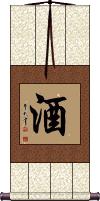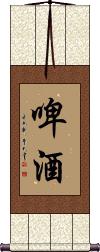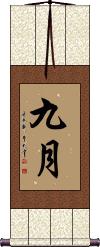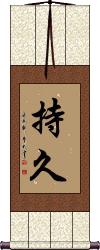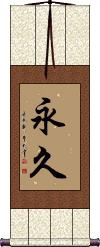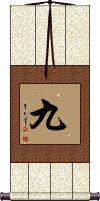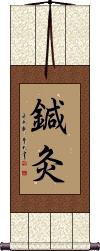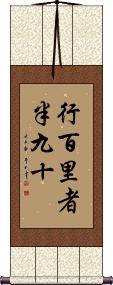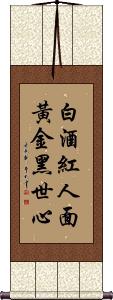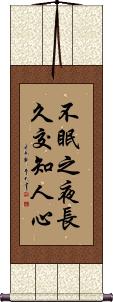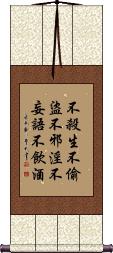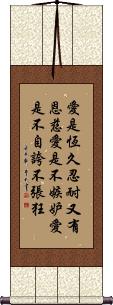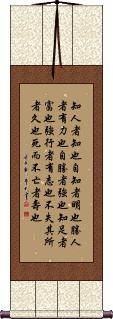Many custom options...
And formats...

Jiu3 in Chinese / Japanese...
Buy a Jiu3 calligraphy wall scroll here!
Personalize your custom “Jiu3” project by clicking the button next to your favorite “Jiu3” title below...
2. Beer
3. September
4. Endurance
6. Nine
7. Wine
8. Acupuncture and Moxibustion
11. Gin
12. Words Have Enormous Weight: One Word Worth Nine Caldrons
13. Walking 100 Miles: Stopping at 90 miles, is the same as stopping half-way
15. Just as Liquor Turns a Face Red, Gold Turns a Heart Black
16. Only the sleepless know the length of night
17. Five Precepts
18. Corinthians 13:4
Wine / Alcohol / Sake
酒 is the Chinese character, Korean Hanja, and Japanese Kanji which means alcohol.
This can refer to wine (esp. rice wine), liquor, spirits, sake, or to alcoholic beverages in general.
In the west, we tend to say “sake” to mean Japanese rice wine, however, this character is a little ambiguous in Japanese. It literally just means alcohol and is often pronounced “shu” in Japanese. Specifically, in Japanese, you might want to ask for “seishu” or 清酒 to get the sake that you are used to in the west. Seishu literally means “clear alcohol.”
Beer
啤酒 means beer in Chinese.
This can refer to virtually any fermented grain-based alcoholic beverage that has bubbles. So this includes all kinds of ales and lagers.
In China, the grains used for beer sometimes include rice. But even in Chinese beer, the concept is the same - beer must be made with hops and yeast.
Beer was the third word I learned in Chinese, and I've toured 3 different breweries in China, Tsing Tao, Lao Shan, and Yanjing. I've done my research on this calligraphy entry!
September
Ninth Month
九月 is the Chinese, Japanese Kanji, and old Korean Hanja for the month of September.
Originally this was for the ninth month of the lunar calendar, now used for the western (Gregorian) calendar.
This can also be the Japanese female given name Kugetsu.
Endurance
持久 means to endure or lasting.
In some contexts, it can mean “persistent” or “persistence” (especially in Japanese and Korean).
Eternal / Long-Lasting
永久 is a Japanese, Chinese, and old Korean word that means everlasting, perpetual, lasting, forever, permanent, eternity, perpetuity, and/or immortality.
This can also be a female given name Haruku in Japan.
Nine
The number nine
九 is the number nine in Chinese, Japanese Kanji, and old Korean Hanja.
九 is a strange selection for a wall scroll, so it's here mostly for reference. I guess it's OK if the number nine is important to you.
![]() Because this character is rather simple (just two strokes), there is an anti-fraud way to write nine on bank documents. This version is shown to the right.
Because this character is rather simple (just two strokes), there is an anti-fraud way to write nine on bank documents. This version is shown to the right.
Wine
葡萄酒 is the Chinese, Japanese Kanji, and old Korean Hanja for wine.
Very specifically, this is for grape wine (an important distinction in Asia where most wines were rice-based until western influences came into play).
The first word, 葡萄 literally means grape (or grapevine), and 酒 means alcohol (generic term for alcohol, sake, wine, liquor).
Acupuncture and Moxibustion
鍼灸 is the Chinese, Japanese Kanji, and old Korean Hanja word for acupuncture-moxibustion.
Facing the Wall Nine Years
面壁九年 is a Buddhist term that means “facing a wall for nine years.”
This refers to the Bodhidharma who stared at a wall in meditation at the Shaolin Temple (or in a cave) for nine years until reaching full enlightenment.
Sumptuous Debauchery
酒池肉林 is a Chinese idiom that is also somewhat known in Japanese and Korean.
This literally means “lakes of wine and forests of meat.”
Figuratively, it refers to debauchery, sumptuous entertainment, a sumptuous feast, or any kind of ridiculously-lavish spread of food and wine.
Words Have Enormous Weight: One Word Worth Nine Caldrons
一言九鼎 is an ancient Chinese proverb used in modern times to talk of profound or powerful words.
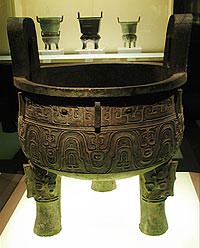 The literal meaning is “one word [worth] nine [sacred] tripods.” The tripod is a highly-prized three-legged (sometimes four-legged) metal pot or kettle of ancient China. They are often made of bronze, and the Emperor would have large ones gilded in gold. See the image to the right for an example.
The literal meaning is “one word [worth] nine [sacred] tripods.” The tripod is a highly-prized three-legged (sometimes four-legged) metal pot or kettle of ancient China. They are often made of bronze, and the Emperor would have large ones gilded in gold. See the image to the right for an example.
Walking 100 Miles: Stopping at 90 miles, is the same as stopping half-way
行百里者半九十 is an old Chinese proverb that speaks to the act of giving up. This phrase suggests that no matter how close you are to finishing your task or journey, giving up just before you finish is just as bad as giving up halfway.
50% finished or 90% finished, the result is the same: “You are not finished.”
You can take what you want from this proverb, but I think it suggests that you should finish what you start, and especially finish that last 10% of your journey or project so that you can honestly say “it's finished.”
Some notes: The character, 里, that I am translating as “mile” is an ancient “Chinese mile” which is actually about half a kilometer - it just doesn't sound right to say “When walking 100 half-kilometers...”
In Wine there is Truth
酒后吐真言 / 酒後吐真言 is a nice Asian proverb if you know a vintner or wine seller - or wine lover - although the actual meaning might not be exactly what you think or hope.
The literal meaning is that someone drinking wine is more likely to let the truth slip out. It can also be translated as “People speak their true feelings after drinking alcohol.”
It's long believed in many parts of Asia that one can not consciously hold up a facade of lies when getting drunk, and therefore the truth will come out with a few drinks.
I've had the experience where a Korean man would not trust me until I got drunk with him (I was trying to gain access to the black market in North Korea which is tough to do as an untrusted outsider) - so I think this idea is still well-practiced in many Asian countries.
Please note that there are two common ways to write the second character of this phrase. The way it's written will be left up to the mood of the calligrapher, unless you let us know that you have a certain preference.
Just as Liquor Turns a Face Red, Gold Turns a Heart Black
白酒紅人面黃金黑世心 literally says: [Just as] white liquor makes people's faces turn red, [So] yellow gold makes people's hearts turn black.
This is a warning about the nature of greed. The suggestion is that one who lusts for gold and riches will eventually have a black heart (or become a heartless greedy bastard). As a wall scroll, this is a reminder and warning to keep yourself from following the greedy path.
Only the sleepless know the length of night
不眠之夜长久交知人心 literally translates as: [Only one who does] not sleep, learns how long the night is; [Only by] long acquaintance [does one] learn a person ['s true] character.
Basically, this proverb suggests that we really need to experience something intimately and for a long time to really know everything about it.
This can also be translated as “Spending years with someone is the only way to know them.”
Note: Sometimes this proverb is split into just the first or second idea alone (first 5 or last 5 characters only).
Five Precepts
不殺生不偷盜不邪淫不妄語不飲酒 is the full list of the five precepts of Buddhism in Chinese.
There are many ways to translate or express these.
The following is one basic way:
1. Do not kill/murder.
2. Do not steal.
3. Do not commit adultery and/or sexual misconduct.
4. Do not lie or speak falsehoods.
5. Do not become intoxicated (with drugs/alcohol).
Here is another take from my favorite magazine: Lion's Roar: Five Precepts
Corinthians 13:4
All you need to know about LOVE
愛是恆久忍耐又有恩慈愛是不嫉妒愛是不自誇不張狂 is 1st Corinthians 13:4 in Chinese.

With large “love” character added.
In English, this reads:
1st Corinthians 13:4 (KJV) Charity suffereth long, and is kind; charity envieth not; charity vaunteth not itself, is not puffed up...
1st Corinthians 13:4 (NIV) Love is patient, love is kind. It does not envy, it does not boast, it is not proud.
1st Corinthians 13:4 (Basic English) Love is never tired of waiting; love is kind; love has no envy; love has no high opinion of itself, love has no pride.
The Chinese translation follows the love meaning, rather than the King James' use of “charity.” I was a little confused when writing this description with the significant differences between the NIV vs. KJV translations. After speaking to a Greek scholar about this, it would seem that the KJV has an almost errant translation with the use of “charity” in place of “love.”
We used the most popular Christian Chinese Bible, which is the Chinese Union Version (CUV). The CUV was first published in 1919. We use this so that the Chinese translation would be as accurate and standard as possible. Any Chinese Christian worth their salt will easily be able to identify this verse when they see these characters.
If you want a big “love” character written above the verse on your artwork, just make a note in the “special instructions” tab when you are customizing your artwork. There is no extra charge for that service on this special verse.
Daodejing / Tao Te Ching - Chapter 33
This is referred to as passage or chapter 33 of the Dao De Jing (often Romanized as “Tao Te Ching”).
These are the words of the philosopher Laozi (Lao Tzu).
To know others is wisdom;
To know oneself is acuity/intelligence.
To conquer others is power,
To conquer oneself is strength.
To know contentment is to have wealth.
To act resolutely is to have purpose.
To stay one's ground is to be enduring.
To die and yet not be forgotten is to be long-lived.
To understand others is to be knowledgeable;
To understand yourself is to be wise.
To conquer others is to have strength;
To conquer yourself is to be strong.
To know when you have enough is to be rich.
To go forward with strength is to have ambition.
To not lose your place is to be long-lasting.
To die but not be forgotten -- that's true long life.
He who is content is rich;
He who acts with persistence has will;
He who does not lose his roots will endure;
He who dies physically but preserves the Dao
will enjoy a long after-life.
Notes:
During our research, the Chinese characters shown here are probably the most accurate to the original text of Laozi. These were taken for the most part from the Mawangdui 1973 and Guodan 1993 manuscripts which pre-date other Daodejing texts by about 1000 years.
Grammar was a little different in Laozi’s time. So you should consider this to be the ancient Chinese version. Some have modernized this passage by adding, removing, or swapping articles and changing the grammar (we felt the oldest and most original version would be more desirable). You may find other versions printed in books or online - sometimes these modern texts are simply used to explain to Chinese people what the original text really means.
This language issue can be compared in English by thinking how the King James (known as the Authorized version in Great Britain) Bible from 1611 was written, and comparing it to modern English. Now imagine that the Daodejing was probably written around 403 BCE (2000 years before the King James Version of the Bible). To a Chinese person, the original Daodejing reads like text that is 3 times more detached compared to Shakespeare’s English is to our modern-day speech.
Extended notes:
While on this Biblical text comparison, it should be noted, that just like the Bible, all the original texts of the Daodejing were lost or destroyed long ago. Just as with the scripture used to create the Bible, various manuscripts exist, many with variations or copyist errors. Just as the earliest New Testament scripture (incomplete) is from 170 years after Christ, the earliest Daodejing manuscript (incomplete) is from 100-200 years after the death of Laozi.
The reason that the originals were lost probably has a lot to do with the first Qin Emperor. Upon taking power and unifying China, he ordered the burning and destruction of all books (scrolls/rolls) except those pertaining to Chinese medicine and a few other subjects. The surviving Daodejing manuscripts were either hidden on purpose or simply forgotten about. Some were not unearthed until as late as 1993.
We compared a lot of research by various archeologists and historians before deciding on this as the most accurate and correct version. But one must allow that it may not be perfect, or the actual and original as from the hand of Laozi himself.
Return to Dwell in Gardens and Fields Poem
This is Tao Yuanming's poem, “Returning to Dwell in Gardens and Fields.”
少無適俗韻 性本愛丘山。
誤落塵網中 一去三十年。
羈鳥戀舊林 池魚思故淵。
開荒南野際 抱拙歸園田。
方宅十餘畝 草屋八九間。
榆柳蔭後簷 桃李羅堂前。
暖暖遠人村 依依墟裡煙。
狗吠深巷中 雞鳴桑樹顛。
戶庭無塵雜 虛室有餘閒。
久在樊籠裡 復得返自然。
Not the results for jiu3 that you were looking for?
Below are some entries from our dictionary that may match your jiu3 search...
| Characters If shown, 2nd row is Simp. Chinese |
Pronunciation Romanization |
Simple Dictionary Definition |
酒 see styles |
jiǔ jiu3 chiu zake ざけ |
More info & calligraphy: Wine / Alcohol / Sake(suffix) alcohol; (alcoholic) drink; liqueur; (surname) Zake surā; maireya; madya. Wine, alcoholic liquor; forbidden to monks and nuns by the fifth commandment. |
九月 see styles |
jiǔ yuè jiu3 yue4 chiu yüeh kugetsu くげつ |
More info & calligraphy: September(adverbial noun) September; (female given name) Kugetsu |
啤酒 see styles |
pí jiǔ pi2 jiu3 p`i chiu pi chiu |
More info & calligraphy: Beer |
持久 see styles |
chí jiǔ chi2 jiu3 ch`ih chiu chih chiu jikyuu / jikyu じきゅう |
More info & calligraphy: Endurance(noun/participle) endurance; persistence; (place-name) Jikyū |
永久 see styles |
yǒng jiǔ yong3 jiu3 yung chiu eikyuu / ekyu えいきゅう |
More info & calligraphy: Eternal / Long-Lasting(n,adj-na,adj-no) (1) eternity; permanence; perpetuity; (2) (hist) Eikyū era (1113.7.13-1118.4.3); (female given name) Haruku |
葡萄酒 see styles |
pú tao jiǔ pu2 tao5 jiu3 p`u t`ao chiu pu tao chiu budoushu / budoshu ぶどうしゅ |
More info & calligraphy: Wine(noun - becomes adjective with の) (grape) wine |
〩 see styles |
jiǔ jiu3 chiu |
numeral 9 in the Suzhou numeral system 蘇州碼子|苏州码子[Su1 zhou1 ma3 zi5] |
久 see styles |
jiǔ jiu3 chiu hisamatsu ひさまつ |
(of a period of time) long (personal name) Hisamatsu Long, for long, long ago; also 久遠. |
乆 see styles |
jiǔ jiu3 chiu |
old variant of 久[jiu3] |
九 see styles |
jiǔ jiu3 chiu chuu / chu チュー |
nine; 9 (numeric) (クー, キュー or チュー in mahjong) nine (chi: jiǔ); (surname) Maru Navan; nava. Nine. |
乣 see styles |
jiǔ jiu3 chiu |
old variant of 糺[jiu3] |
灸 see styles |
jiǔ jiu3 chiu kyuu; yaito / kyu; yaito きゅう; やいと |
moxibustion (TCM) moxibustion; (personal name) Kyū |
玖 see styles |
jiǔ jiu3 chiu kokono ここの koko ここ ku く kyuu / kyu きゅう |
black jade; nine (banker's anti-fraud numeral) (numeric) nine |
韭 see styles |
jiǔ jiu3 chiu nira にら kamira かみら |
leek (out-dated or obsolete kana usage) (kana only) Chinese chive; garlic chive (Allium tuberosum) |
韮 韭 see styles |
jiǔ jiu3 chiu nira にら kamira かみら |
variant of 韭[jiu3] (out-dated or obsolete kana usage) (kana only) Chinese chive; garlic chive (Allium tuberosum) |
㺵 see styles |
jiǔ jiu3 chiu |
black jade (variant of 玖[jiu3]) |
N久 see styles |
n jiǔ n jiu3 n chiu |
a very long time (etymology: in mathematics, n represents an arbitrarily large number) |
一九 see styles |
yī jiǔ yi1 jiu3 i chiu motochika もとちか |
(given name) Motochika A Shingon term for Amitābha. |
下酒 see styles |
xià jiǔ xia4 jiu3 hsia chiu |
to be appropriate to have with alcohol; to down one's drink |
不久 see styles |
bù jiǔ bu4 jiu3 pu chiu fu ku |
not long (after); before too long; soon; soon after Not long (in time). |
久久 see styles |
jiǔ jiǔ jiu3 jiu3 chiu chiu hisaharu ひさはる |
for a very long time (adj-na,adj-no,adv,n) (in a) long time; long time (ago); while (ago); long ago; long while (ago); (in a) long while; (personal name) Hisaharu uncommonly |
久之 see styles |
jiǔ zhī jiu3 zhi1 chiu chih hisayuki ひさゆき |
for a long time (given name) Hisayuki |
久仰 see styles |
jiǔ yǎng jiu3 yang3 chiu yang |
honorific: I've long looked forward to meeting you.; It's an honor to meet you at last. |
久住 see styles |
jiǔ zhù jiu3 zhu4 chiu chu hisazumi ひさずみ |
(surname) Hisazumi to stay a long time |
久作 see styles |
jiǔ zuò jiu3 zuo4 chiu tso hisasaku ひささく |
(surname) Hisasaku made for an extended period of time |
久保 see styles |
jiǔ bǎo jiu3 bao3 chiu pao hisayoshi ひさよし |
Kubo (Japanese surname) (male given name) Hisayoshi |
久別 久别 see styles |
jiǔ bié jiu3 bie2 chiu pieh |
a long period of separation |
久參 久参 see styles |
jiǔ sān jiu3 san1 chiu san kyusan |
veteran practitioner |
久已 see styles |
jiǔ yǐ jiu3 yi3 chiu i kui |
long ago; a long time since long since |
久後 久后 see styles |
jiǔ hòu jiu3 hou4 chiu hou hisago ひさご |
(surname) Hisago in the future |
Click here for more jiu3 results from our dictionary
The following table may be helpful for those studying Chinese or Japanese...
| Title | Characters | Romaji (Romanized Japanese) | Various forms of Romanized Chinese | |
| Wine Alcohol Sake | 酒 | sake / shu | jiǔ / jiu3 / jiu | chiu |
| Beer | 啤酒 | pí jiǔ / pi2 jiu3 / pi jiu / pijiu | p`i chiu / pichiu / pi chiu | |
| September | 九月 | kugatsu | jiǔ yuè / jiu3 yue4 / jiu yue / jiuyue | chiu yüeh / chiuyüeh |
| Endurance | 持久 | ji kyuu / jikyuu / ji kyu | chí jiǔ / chi2 jiu3 / chi jiu / chijiu | ch`ih chiu / chihchiu / chih chiu |
| Eternal Long-Lasting | 永久 | haruku | yǒng jiǔ / yong3 jiu3 / yong jiu / yongjiu | yung chiu / yungchiu |
| Nine | 九 / 玖 | kyuu / kyu | jiǔ / jiu3 / jiu | chiu |
| Wine | 葡萄酒 | bu dou shu / bu dou sake budoushu / budousake bu do shu / bu do sake | pú tao jiǔ pu2 tao5 jiu3 pu tao jiu putaojiu | p`u t`ao chiu putaochiu pu tao chiu |
| Acupuncture and Moxibustion | 鍼灸 / 針灸 针灸 | shin kyuu / shinkyuu / shin kyu | zhēn jiǔ / zhen1 jiu3 / zhen jiu / zhenjiu | chen chiu / chenchiu |
| Facing the Wall Nine Years | 面壁九年 | menpeki kyunen menpekikyunen | miàn bì jiǔ nián mian4 bi4 jiu3 nian2 mian bi jiu nian mianbijiunian | mien pi chiu nien mienpichiunien |
| Sumptuous Debauchery | 酒池肉林 | shu chi niku rin shuchinikurin | jiǔ chí ròu lín jiu3 chi2 rou4 lin2 jiu chi rou lin jiuchiroulin | chiu ch`ih jou lin chiuchihjoulin chiu chih jou lin |
| Gin | 杜松子酒 | dù sōng zǐ jiǔ du4 song1 zi3 jiu3 du song zi jiu dusongzijiu | tu sung tzu chiu tusungtzuchiu |
|
| Words Have Enormous Weight: One Word Worth Nine Caldrons | 一言九鼎 | yī yán jiǔ dǐng yi1 yan2 jiu3 ding3 yi yan jiu ding yiyanjiuding | i yen chiu ting iyenchiuting |
|
| Walking 100 Miles: Stopping at 90 miles, is the same as stopping half-way | 行百里者半九十 | xíng bǎi lǐ zhě bàn jiǔ shí xing2 bai3 li3 zhe3 ban4 jiu3 shi2 xing bai li zhe ban jiu shi xingbailizhebanjiushi | hsing pai li che pan chiu shih hsingpailichepanchiushih |
|
| In Wine there is Truth | 酒后吐真言 / 酒後吐真言 酒后吐真言 | jiǔ hòu tǔ zhēn yán jiu3 hou4 tu3 zhen1 yan2 jiu hou tu zhen yan jiuhoutuzhenyan | chiu hou t`u chen yen chiuhoutuchenyen chiu hou tu chen yen |
|
| Just as Liquor Turns a Face Red, Gold Turns a Heart Black | 白酒紅人面黃金黑世心 白酒红人面黄金黑世心 | bái jiǔ hóng rén miàn huáng jīn hēi shì xīn bai2 jiu3 hong2 ren2 mian4 huang2 jin1 hei1 shi4 xin1 bai jiu hong ren mian huang jin hei shi xin | pai chiu hung jen mien huang chin hei shih hsin | |
| Only the sleepless know the length of night | 不眠之夜長久交知人心 不眠之夜长久交知人心 | bù mián zhī yè cháng jiǔ jiāo zhī rén xīn bu4 mian2 zhi1 ye4 chang2 jiu3 jiao1 zhi1 ren2 xin1 bu mian zhi ye chang jiu jiao zhi ren xin | pu mien chih yeh ch`ang chiu chiao chih jen hsin pu mien chih yeh chang chiu chiao chih jen hsin |
|
| Five Precepts | 不殺生不偷盜不邪淫不妄語不飲酒 不杀生不偷盗不邪淫不妄语不饮酒 | bù shā shēng bù tōu dào bù xié yín bù wàng yǔ bù yǐn jiǔ bu4 sha1 sheng1 bu4 tou1 dao4 bu4 xie2 yin2 bu4 wang4 yu3 bu4 yin3 jiu3 bu sha sheng bu tou dao bu xie yin bu wang yu bu yin jiu | pu sha sheng pu t`ou tao pu hsieh yin pu wang yü pu yin chiu pu sha sheng pu tou tao pu hsieh yin pu wang yü pu yin chiu |
|
| Corinthians 13:4 | 愛是恆久忍耐又有恩慈愛是不嫉妒愛是不自誇不張狂 爱是恒久忍耐又有恩慈爱是不嫉妒爱是不自夸不张狂 | ài shì héng jiǔ rěn nài yòu yǒu én cí ài shì bú jì dù ài shì bú zì kuā bù zhāng kuáng ai4 shi4 heng2 jiu3 ren3 nai4 you4 you3 en2 ci2 ai4 shi4 bu2 ji4 du4 ai4 shi4 bu2 zi4 kua1 bu4 zhang1 kuang2 ai shi heng jiu ren nai you you en ci ai shi bu ji du ai shi bu zi kua bu zhang kuang | ai shih heng chiu jen nai yu yu en tz`u ai shih pu chi tu ai shih pu tzu k`ua pu chang k`uang ai shih heng chiu jen nai yu yu en tzu ai shih pu chi tu ai shih pu tzu kua pu chang kuang |
|
| Daodejing Tao Te Ching - Chapter 33 | 知人者知也自知者明也勝人者有力也自勝者強也知足者富也強行者有志也不失其所者久也死而不亡者壽也 知人者知也自知者明也胜人者有力也自胜者强也知足者富也强行者有志也不失其所者久也死而不亡者寿也 | zhī rén zhě zhī yě zì zhī zhě míng yě shèng rén zhě yǒu lì yě zì shèng zhě qiáng yě zhī zú zhě fù yě qiáng xíng zhě yǒu zhì yě bù zhī qí suǒ zhě jiǔ yě sǐ ér bù wáng zhě shòu yě zhi1 ren2 zhe3 zhi1 ye3 zi4 zhi1 zhe3 ming2 ye3 sheng4 ren2 zhe3 you3 li4 ye3 zi4 sheng4 zhe3 qiang2 ye3 zhi1 zu2 zhe3 fu4 ye3 qiang2 xing2 zhe3 you3 zhi4 ye3 bu4 zhi1 qi2 suo3 zhe3 jiu3 ye3 si3 er2 bu4 wang2 zhe3 shou4 ye3 zhi ren zhe zhi ye zi zhi zhe ming ye sheng ren zhe you li ye zi sheng zhe qiang ye zhi zu zhe fu ye qiang xing zhe you zhi ye bu zhi qi suo zhe jiu ye si er bu wang zhe shou ye | chih jen che chih yeh tzu chih che ming yeh sheng jen che yu li yeh tzu sheng che ch`iang yeh chih tsu che fu yeh ch`iang hsing che yu chih yeh pu chih ch`i so che chiu yeh ssu erh pu wang che shou yeh chih jen che chih yeh tzu chih che ming yeh sheng jen che yu li yeh tzu sheng che chiang yeh chih tsu che fu yeh chiang hsing che yu chih yeh pu chih chi so che chiu yeh ssu erh pu wang che shou yeh |
|
| Return to Dwell in Gardens and Fields Poem | 少無適俗韻性本愛丘山誤落塵網中一去三十年羈鳥戀舊林池魚思故淵開荒南野際抱拙歸園田方宅十余畝草屋八九間榆柳蔭后檐桃李羅堂前暖暖遠人村依依墟里煙狗吠深巷中雞鳴桑樹顛戶庭無塵雜虛室有余閑久在樊籠里復得返自然 少无适俗韵性本爱丘山误落尘网中一去三十年羁鸟恋旧林池鱼思故渊开荒南野际抱拙归园田方宅十余亩草屋八九间榆柳荫后檐桃李罗堂前暖暖远人村依依墟里烟狗吠深巷中鸡鸣桑树颠户庭无尘杂虚室有余闲久在樊笼里复得返自然 | shào wú shì sú yùn xìng běn ài qiū shān wù luò chén wǎng zhōng yī qù sān shí nián jī niǎo liàn jiù lín chí yú sī gù yuān kāi huāng nán yě jì bào zhuō guī yuán tián fāng zhái shí yú mǔ cǎo wū bā jiǔ jiān yú liǔ yīn hòu yán táo lǐ luó táng qián nuǎn nuǎn yuǎn rén cūn yī yī xū lǐ yān gǒu fèi shēn xiàng zhōng jī míng sāng shù diān hù tíng wú chén zá xū shì yǒu yú xián jiǔ zài fán lóng lǐ fù dé fǎn zì rán shao4 wu2 shi4 su2 yun4 xing4 ben3 ai4 qiu1 shan1 wu4 luo4 chen2 wang3 zhong1 yi1 qu4 san1 shi2 nian2 ji1 niao3 lian4 jiu4 lin2 chi2 yu2 si1 gu4 yuan1 kai1 huang1 nan2 ye3 ji4 bao4 zhuo1 gui1 yuan2 tian2 fang1 zhai2 shi2 yu2 mu3 cao3 wu1 ba1 jiu3 jian1 yu2 liu3 yin1 hou4 yan2 tao2 li3 luo2 tang2 qian2 nuan3 nuan3 yuan3 ren2 cun1 yi1 yi1 xu1 li3 yan1 gou3 fei4 shen1 xiang4 zhong1 ji1 ming2 sang1 shu4 dian1 hu4 ting2 wu2 chen2 za2 xu1 shi4 you3 yu2 xian2 jiu3 zai4 fan2 long2 li3 fu4 de2 fan3 zi4 ran2 shao wu shi su yun xing ben ai qiu shan wu luo chen wang zhong yi qu san shi nian ji niao lian jiu lin chi yu si gu yuan kai huang nan ye ji bao zhuo gui yuan tian fang zhai shi yu mu cao wu ba jiu jian yu liu yin hou yan tao li luo tang qian nuan nuan yuan ren cun yi yi xu li yan gou fei shen xiang zhong ji ming sang shu dian hu ting wu chen za xu shi you yu xian jiu zai fan long li fu de fan zi ran | shao wu shih su yün hsing pen ai ch`iu shan wu lo ch`en wang chung i ch`ü san shih nien chi niao lien chiu lin ch`ih yü ssu ku yüan k`ai huang nan yeh chi pao cho kuei yüan t`ien fang chai shih yü mu ts`ao wu pa chiu chien yü liu yin hou yen t`ao li lo t`ang ch`ien nuan nuan yüan jen ts`un i i hsü li yen kou fei shen hsiang chung chi ming sang shu tien hu t`ing wu ch`en tsa hsü shih yu yü hsien chiu tsai fan lung li fu te fan tzu jan shao wu shih su yün hsing pen ai chiu shan wu lo chen wang chung i chü san shih nien chi niao lien chiu lin chih yü ssu ku yüan kai huang nan yeh chi pao cho kuei yüan tien fang chai shih yü mu tsao wu pa chiu chien yü liu yin hou yen tao li lo tang chien nuan nuan yüan jen tsun i i hsü li yen kou fei shen hsiang chung chi ming sang shu tien hu ting wu chen tsa hsü shih yu yü hsien chiu tsai fan lung li fu te fan tzu jan |
|
| In some entries above you will see that characters have different versions above and below a line. In these cases, the characters above the line are Traditional Chinese, while the ones below are Simplified Chinese. | ||||
Successful Chinese Character and Japanese Kanji calligraphy searches within the last few hours...
